Greetings! I'm Aneesh Sreedharan, CEO of 2Hats Logic Solutions. At 2Hats Logic Solutions, we are dedicated to providing technical expertise and resolving your concerns in the world of technology. Our blog page serves as a resource where we share insights and experiences, offering valuable perspectives on your queries.

QUICK SUMMARY
Order fulfillment delays impact customer satisfaction and business growth. AI-driven solutions optimise demand forecasting, automate inventory management, and improve supplier coordination. Smart warehousing and predictive maintenance enhance operational efficiency, reducing bottlenecks.
While AI adoption poses challenges like integration complexity and data security concerns, its long-term benefits outweigh initial costs. Businesses leveraging AI in supply chains achieve faster deliveries, lower operational costs, and improved customer experience.
Now, waiting is the new unacceptable. Every delayed shipment, every backorder notification, every “we’re sorry for the inconvenience” email chips away at customer loyalty that took years to build.
When competitors promise same-day delivery, your three-day window feels too slow. Internally, your team struggles with manual tasks, fixing issues instead of focusing on growth.
But what if the technology reshaping industries could turn your supply chain into an advantage? What if AI predicted disruptions and rerouted resources to prevent them? The supply chain revolution is here, and companies that embrace it now will leave their competitors wondering what hit them.
Understanding Order Fulfillment Delays
Before exploring AI-driven solutions, it’s crucial to understand why order fulfillment delays happen and how they impact businesses. Delays can affect revenue, customer satisfaction, and operational efficiency, making proactive solutions essential.
Common Causes of Order Delays
These are the common causes of order fulfillment delays:
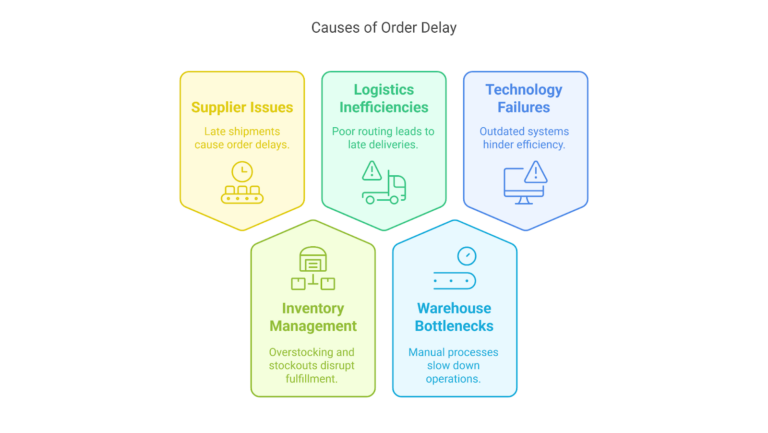
- Supplier Issues: Late shipments from suppliers create backlogs, delaying order fulfillment.
- Inventory Management: Overstocking or stockouts disrupt fulfillment, leading to delayed shipments.
- Logistics Inefficiencies: Ineffective routing and poor coordination result in late deliveries.
- Warehouse Bottlenecks: Manual processes slow down picking, packing, and order dispatching.
- Technology Failures: Outdated systems hinder real-time tracking and automation.
The Ripple Effect of Delays
When orders are delayed, the impact extends beyond just delivery times. Negative reviews and customer dissatisfaction rise, affecting long-term brand loyalty.
Customer Expectations & Competitor Pressure
Modern consumers expect fast, predictable deliveries. The shipping delays lead to complaints, bad reviews, refunds, and pushing customers towards competitors.
Hidden Costs of Delays
Beyond lost sales, delays increase costs in the following:
- Customer service & support: More inquiries and complaints
- Returns & refunds: Higher processing costs due to late shipments
- Brand reputation damage: Negative reviews affect long-term business
Addressing these challenges requires real-time visibility, predictive analytics, and automation, all of which AI can provide.
How Does AI Eliminate Order Fulfillment Bottlenecks?
AI-powered solutions are revolutionising supply chains by automating repetitive tasks, improving accuracy, and optimising workflows. AI-driven insights help businesses identify inefficiencies and implement data-backed solutions.
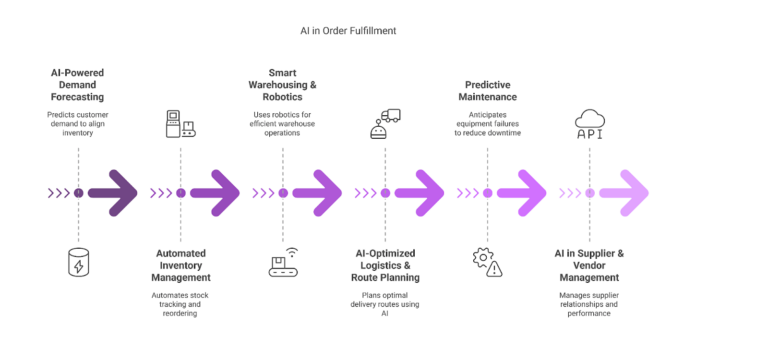
AI-Powered Demand Forecasting
AI analyses historical sales data to predict demand fluctuations with high accuracy. This prevents overstocking and stockouts, ensuring optimal inventory levels.
Machine learning models adjust forecasts in real time based on changing trends. Businesses can minimise waste and maximise availability by making data-driven purchasing decisions.
Automated Inventory Management
AI tracks stock levels in real time using computer vision and IoT sensors. This enables automated replenishment, reducing manual errors and stock discrepancies.
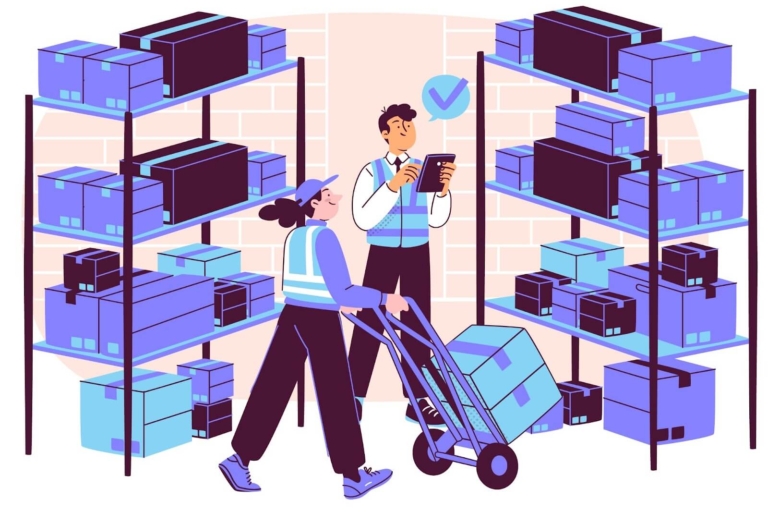
Predictive analytics help optimise storage by suggesting ideal stock distribution. Businesses can reduce storage costs and prevent delays caused by inventory mismanagement.
Smart Warehousing & Robotics
Autonomous robots streamline order picking, packing, and sorting processes. AI-driven systems reduce human errors and speed up warehouse operations.
AI-powered algorithms optimise pick-path routes for warehouse workers. This minimises travel time and enhances overall efficiency in order fulfillment.
Contact our team today for a no-obligation consultation!
AI-Optimized Logistics & Route Planning
AI analyses real-time traffic and weather conditions to optimise delivery routes. This ensures faster shipments and reduces fuel costs.
Dynamic route planning adapts to disruptions, preventing delays. AI enhances last-mile delivery efficiency, improving customer satisfaction.
Warning: Delays in order fulfillment can lead to customer churn and damage brand reputation.
Predictive Maintenance
AI detects early signs of equipment failure using IoT and sensor data. Businesses can schedule maintenance before breakdowns occur, preventing costly downtime.
Proactive maintenance strategies extend the lifespan of machinery. This ensures smooth operations and uninterrupted fulfillment processes.
AI in Supplier & Vendor Management
AI evaluates supplier performance using real-time data analysis. Businesses can identify delays early and switch to alternative vendors if needed.
Automated vendor scoring improves procurement decision-making. This helps maintain a reliable supply chain and reduces bottlenecks caused by supplier inefficiencies.
Challenges of AI Adoption in Supply Chains
While AI offers immense benefits, businesses must overcome several challenges when integrating AI into their supply chain processes. Strategic planning and phased implementation can mitigate potential obstacles. The key challenges include:
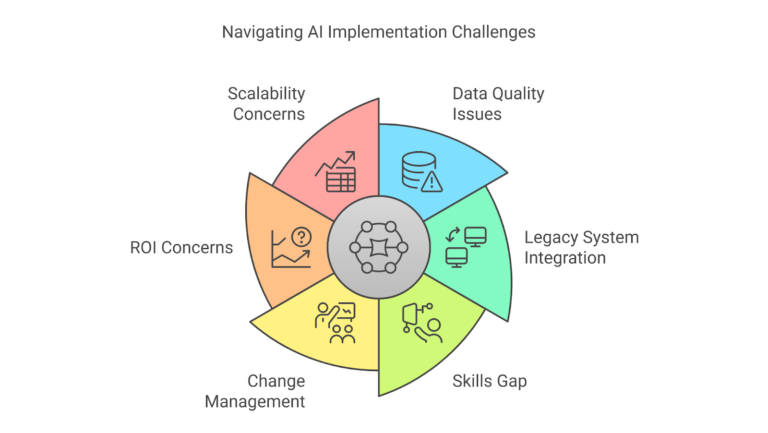
- Data Quality Issues: AI relies on high-quality data; companies must ensure clean, structured data for accuracy.
- Legacy System Integration: AI must integrate with existing ERP and logistics software to maximise impact.
- Skills Gap: Businesses need AI specialists familiar with supply chain operations to drive successful implementation.
- Change Management: Employees may resist AI adoption; training programs help ensure a smooth transition.
- ROI Concerns: Companies must calculate AI’s true impact, focusing on efficiency, cost reduction, and scalability.
- Scalability Concerns: AI solutions must handle increasing data volumes. Poor scalability can limit long-term benefits.
Data Privacy & Security Considerations in AI-Powered Supply Chains
AI systems process vast amounts of sensitive business and customer data, making data security crucial. Companies must implement robust security measures to protect against breaches and unauthorised access. The key considerations for data security and privacy include:
- Data Vulnerabilities: Protect customer shipping details and inventory data from cyber threats and fraud.
- Compliance with Regulations: Ensure AI aligns with GDPR, CCPA, and other global data laws to avoid legal penalties.
- Blockchain for Secure Transactions: Blockchain enhances transparency, traceability, and security.
- Encryption & Access Control: Implement robust encryption and role-based access control to safeguard AI-driven operations.
- Lessons from Security Breaches: Learn from past cyberattacks to develop proactive risk mitigation strategies.
Pro-Tip: Address data security concerns early by implementing robust encryption and compliance measures before scaling AI solutions.
Real-World AI Success Stories
AI has already transformed order fulfillment for major industry leaders. Companies leveraging AI report significant efficiency gains, cost savings, and improved customer satisfaction.
- Amazon: Reduced fulfillment time by 18% using robotics and AI-powered warehouse management.
- UPS (ORION System): Saved 100+ million miles annually through AI-driven route optimisation, reducing emissions.
- Zara: Leveraged AI for real-time inventory management, reducing stockouts by 30%.
Implementing AI in Your Supply Chain: A Step-by-Step Guide
For businesses ready to implement AI, here’s a structured roadmap to drive efficiency and innovation. The steps to implement AI in the supply chain are as follows:
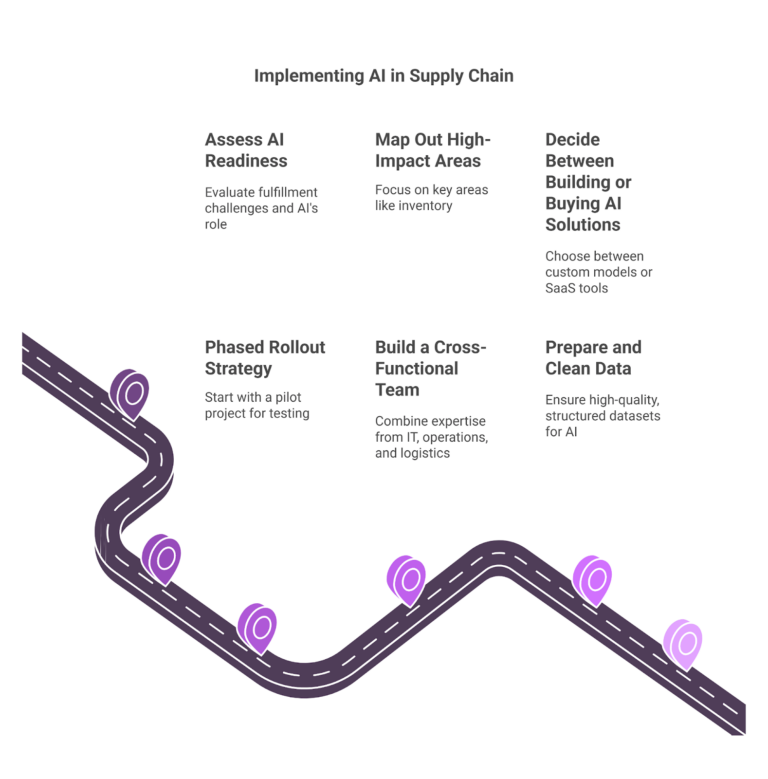
- Assess AI Readiness: Evaluate fulfillment challenges and AI’s role in improving operations.
- Map Out High-Impact Areas: Focus on inventory management, warehousing, and logistics optimisation.
- Decide Between Building or Buying AI Solutions: Choose between custom AI models or SaaS AI tools.
- Phased Rollout Strategy: Start with a pilot project, analysing performance before full-scale deployment.
- Build a Cross-Functional Team: Combine IT, operations, and logistics expertise for seamless integration.
- Prepare and Clean Data: Ensure high-quality, structured datasets for AI accuracy and reliability.
- Monitor Key Performance Indicators (KPIs): Track fulfillment time, cost savings, and error reduction metrics.
Conclusion
The difference between supply chains that consistently deliver and those that consistently disappoint isn’t just technology, it’s intelligent implementation. While your competitors are still debating whether AI belongs in future roadmaps, forward-thinking businesses already see tangible results.
The question isn’t whether you should transform your supply chain with AI but how quickly you can afford to start. By partnering with 2Hats Logic, you gain more than just cutting-edge technology, you access a team of supply chain specialists who understand that your business isn’t just another implementation project.
FAQ
Why do order fulfillment delays happen?
Delays occur due to supplier issues, inventory mismanagement, logistics inefficiencies, and unexpected demand fluctuations.
How can AI help reduce order fulfillment delays?
AI optimises demand forecasting, automates inventory management, improves logistics, and enhances supplier coordination.
How does AI improve inventory management?
AI provides real-time stock tracking and automated replenishment, ensuring optimal inventory levels.
How does AI enhance logistics and delivery speed?
AI optimises delivery routes, predicts delays, and ensures faster, more efficient shipments.
Is AI expensive to implement in supply chains?
Initial costs can be high, but AI reduces long-term operational costs and improves efficiency.
Table of contents
- Understanding Order Fulfillment Delays
- How Does AI Eliminate Order Fulfillment Bottlenecks?
- Challenges of AI Adoption in Supply Chains
- Data Privacy & Security Considerations in AI-Powered Supply Chains
- Real-World AI Success Stories
- Implementing AI in Your Supply Chain: A Step-by-Step Guide
- Conclusion

Related Articles






